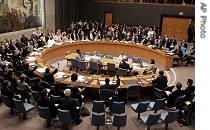VOA标准英语10月-Five Countries Elected to UN Security Council(在线收听)
 |
| U.N. Security Council |
The vote, which takes place by secret ballot in the U.N. General Assembly, saw seven countries officially competing for the five open seats. All 192-member states participated. Candidates needed a two-thirds majority or 128 votes to secure a seat.
The most hotly contested seats were for Western Europe. Austria and Turkey beat out Iceland for the two seats allocated to this region.
Turkish Foreign Minister Ali Babacan said the strong support Turkey received showed the international community's confidence in Turkey, which is currently in negotiations to join the European Union. He said Turkey would continue to work to contribute to international peace and security in its new role.
"Our key works will be dialogue, diplomacy, peaceful solution to conflicts," he said.
This will be Turkey's fourth time sitting on the council. Austria has served on the council twice before. This year was Iceland's first attempt to become a member. Some diplomats said privately that Iceland's bid was probably hurt by the recent collapse of its financial sector.
For the Asian seat, Japan roundly defeated Iran. Japan received 158 votes, Iran only 32.
"I would like to highlight how fitting it is that Iran only secured 32 votes," said British Ambassador John Sawers. "Iran is a subject on the agenda of the Security Council - there are sanctions on Iran because of its nuclear program - and its comprehensive defeat -- a thrashing of Iran -- is a very important signal of whole membership's concern about Iran's actions."
Japan is a regional power and the second largest donor to the United Nations. It hopes to become a permanent member of the Security Council if that body is reformed and expanded.
The seats for Africa and Latin America and the Caribbean were uncontested.
Uganda's Ambassador, Francis Butagira, said his country hopes to become a bridge between big powers and smaller nations in reaching compromise. Uganda has been a contributor to U.N. peacekeeping missions in Darfur and Somalia and Ambassador Butagira said African issues would be high on Uganda's agenda.
"Since most conflicts are on the African continent, we hope to play a very active role toward resolution of those conflicts and maintenance of international peace and security," he said.
Mexico, which has served three previous terms on the council, was unopposed in its bid for the Latin America and Caribbean seat.
Nominations are not required, countries simply announce their intention to run, sometimes many years in advance. Consideration is given to an equitable geographical distribution and a candidate's contribution to the maintenance of international peace and security.
There are 15 seats on the council. Five are permanent veto-wielding members - China, France, Russia, Britain and the United States. Currently, the other five non-permanent members are Burkina Faso, Costa Rica, Croatia, Libya and Vietnam.
The five newly elected members will replace Belgium, Indonesia, Italy, Panama and South Africa, whose two-year terms conclude at the end of this year.